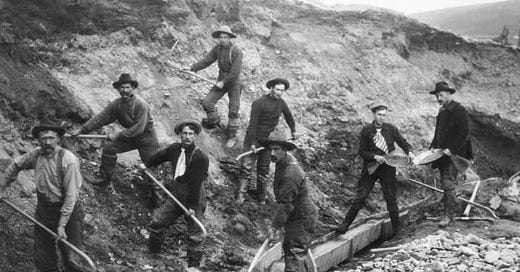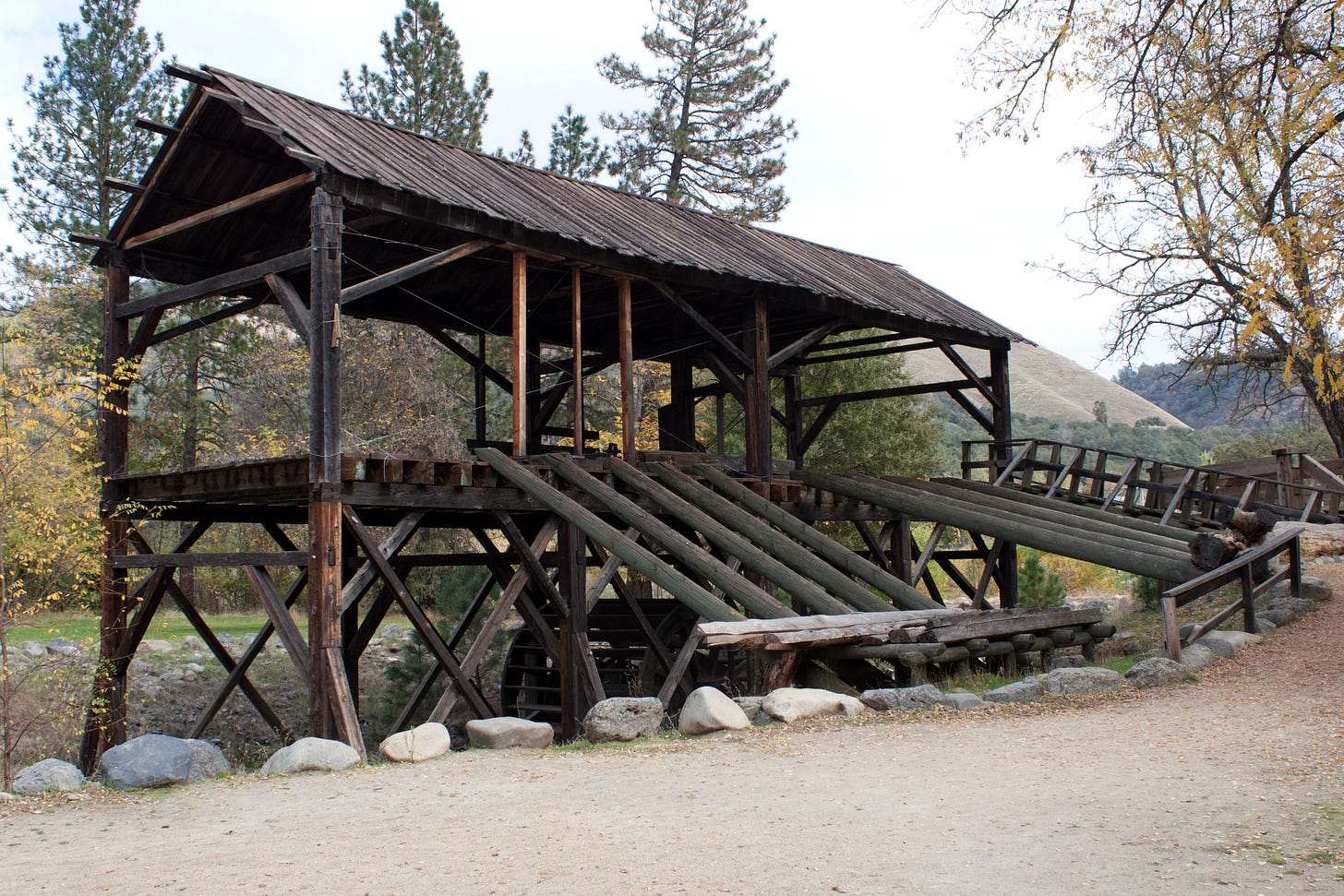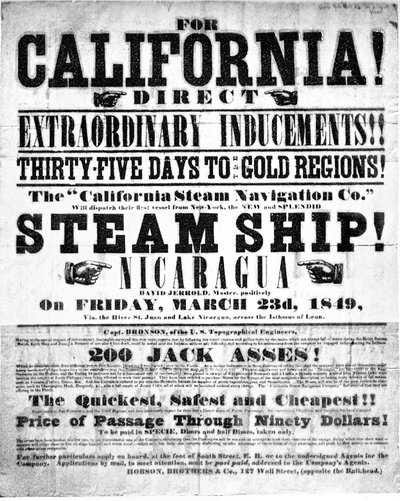January 24 - Gold Discovered at Sutter's Mill
From the Fever of Gold to the Purity of Faith: Unveiling the Idols in Our Lives
This is the day James Marshall discovered gold at Sutter's Mill in Coloma, California, in 1848, kicking off the California Gold Rush.
In today's devotional, we will explore the lengths people go to in the pursuit of material wealth and how that contrasts with our pursuit of God. Are you willing to give up everything to follow Christ, or have material idols shackled your spirit?
"You shall have no other gods before me." - Exodus 20:3 (NIV)
This Date in History
On January 24, 1848, a seminal event occurred that would irreversibly alter the course of American history. James Wilson Marshall, a carpenter from New Jersey, discovered flakes of gold in the American River at Sutter's Mill in Coloma, California. Marshall was in the midst of constructing a water-powered sawmill for John Sutter, a Swiss pioneer who had acquired vast tracts of land in California with hopes of building an agricultural empire.
The exact moment of discovery is etched in American lore. Marshall later recounted picking up a piece of metal, about half the size and shape of a pea. His eyes widened as he bit down on the piece, testing its malleability, a characteristic trait of pure gold. Almost immediately, Marshall and Sutter performed additional tests, confirming the authenticity of the find.
Despite both men's attempts to keep the discovery a secret, word began to leak out. Initially, it was the local population that began flocking to the American River. However, by the end of 1848, President James K. Polk officially announced the discovery, and what had been a mere trickle of prospectors transformed into a deluge. The '49ers, as they came to be known, were not solely from the United States; people from Latin America, Europe, Australia, and China also set sail for California. It was a mass migration of unprecedented scale; estimates suggest that approximately 300,000 people ventured to California during the Gold Rush.
The socio-economic impact was immediate and dramatic. California, which had been a Mexican territory just a few years before, rapidly transitioned from a sparsely populated region to a burgeoning state, achieving statehood in just two years. San Francisco, once a small settlement, became a thriving port city almost overnight.
However, the Gold Rush was not without its dark chapters. Native American communities faced displacement, suffering, and death as their lands were overrun. Environmental repercussions were severe, including river rerouting and deforestation, which led to ecological imbalances still felt today.
The burst of prosperity also had its pitfalls. Fortunes were as easily lost as they were gained. The romanticized notion of "striking it rich" was often met with the harsh reality of difficult working conditions, disease, and lawlessness. While some returned home wealthier, many more returned broken, both financially and spiritually.
Historical Context
The California Gold Rush of 1848 unfolded within a complex tapestry of American expansionism and geopolitical shifts. This was the era of "Manifest Destiny," a term coined in 1845 by journalist John L. O'Sullivan, which articulated the belief that Americans were divinely destined to expand their dominion across the continent. Such an ethos fueled the annexation of Texas in 1845 and the conclusion of the Mexican-American War in 1848, which led to the United States acquiring present-day California, Arizona, New Mexico, and other southwestern states.
The prevailing mindset was not solely economic or geopolitical but also deeply influenced by the Second Great Awakening, a religious revival that swept the nation from the late 18th century to the early 19th century. This awakening emphasized individual piety and virtue, resonating with a populace yearning for a spiritual justification for their material pursuits. As a result, the same society that raced to California in search of gold was also building churches and participating in revivals, struggling to reconcile spiritual and material aspirations.
Across the Atlantic, Europe was grappling with the revolutions of 1848, a series of interconnected political uprisings that significantly impacted continental Europe. In China, the devastating Opium Wars had just concluded, causing significant political and economic instability. These international circumstances converged to make the California Gold Rush not merely an American phenomenon but a global one, as people from diverse backgrounds sought refuge or riches on American soil.
In the midst of these converging histories, technologies like the steamship and the telegraph were rapidly shrinking the world. The same technological advancements that facilitated the spread of revivalist messages or war dispatches also enabled news of the Gold Rush to travel faster and wider than ever before. It was a moment in history when human ambition, whether for material gain or spiritual enlightenment, found both the means and the justification to manifest in ways previously unimagined.
Did You Know?
The term "49ers," commonly associated with the Gold Rush, originates from the surge of prospectors arriving in California in 1849. However, the San Francisco 49ers, the professional American football team, also draw their name from these Gold Rush adventurers. This link bridges two seemingly disparate realms: sports and history, making the legacy of the 49ers a unique cultural footprint that endures to this day.
Learn More
"The Age of Gold: The California Gold Rush and the New American Dream" by H.W. Brands
"They Saw the Elephant: Women in the California Gold Rush" by JoAnn Levy
"The World Rushed In: The California Gold Rush Experience" by J.S. Holliday
"Roaring Camp: The Social World of the California Gold Rush" by Susan Lee Johnson
Today’s Reflection
The discovery of gold at Sutter's Mill was more than just a singular event—it was an embodiment of the complexities of human ambition. Tens of thousands risked life and limb, traversing dangerous terrain and leaving behind their familiar worlds. The overriding motivation? The allure of gold—of material wealth. In a similar way, the Second Commandment warns against the perils of misplaced devotion. It urges us to check the priorities ruling our hearts. Are they objects of true worship or merely golden calves of our own making? As stated in Exodus 20:3, "You shall have no other gods before me."
The call to radical abandonment for the sake of the Gospel is not a call to irresponsibility but to a deeper form of fidelity—to give up everything that stands between us and God. Anything taking the place of God becomes an idol, unworthy of our affection and focus. Just as people sacrificed so much to join the California Gold Rush, what are we willing to forsake to gain Christ? Is our zeal for the Kingdom of God as intense as the miners' was for gold?
This leaves us pondering a piercing question: Why does the prospect of material gain compel people to such extraordinary lengths, while the eternal riches of a relationship with God so often fail to elicit the same level of sacrifice? The global circumstances surrounding the Gold Rush—America's Manifest Destiny, the Second Great Awakening, and international uprisings—all revealed a world in flux. People were searching for meaning, stability, and, most of all, hope. They found it, or so they thought, in the glimmer of Californian gold. Yet, how many of us search for hope in possessions, social status, or even relationships, neglecting the eternal hope offered through Christ?
In the time of the Gold Rush, society was also deeply influenced by spiritual revivals. Yet, one must question how much of that spirituality was driven by a genuine love for God and how much was simply the desire for a divine stamp of approval on earthly endeavors. God is not a talisman to bless our worldly pursuits. He is the Alpha and the Omega, deserving of our full allegiance and complete devotion.
If we were to apply these teachings to our lives, we would be faced with an uncomfortable realization: most of us are not ready to abandon our "gold"—our comfort zones, our earthly securities, our self-crafted identities—for the sake of wholeheartedly pursuing God. Yet, the Bible calls us to do just that. Jesus himself states in Mark 8:34, "Whoever wants to be my disciple must deny themselves and take up their cross and follow me."
The California Gold Rush offers more than a historical lesson; it offers a spiritual mirror, reflecting back to us the true objects of our devotion. Today, let us each examine ourselves, pondering the weight of the Scripture and the call to a radical, God-centered life. Are we willing to risk it all for Christ, as thousands did, for a chance at material wealth? It's a question that each of us must answer, not just with words but with the orientation of our lives. After all, what is your gold, and what are you willing to do to possess it?
Practical Application
For one week, undertake a “spiritual audit” of your life. Each day, jot down the things you prioritize or expend the most energy on. At the end of the week, analyze these lists prayerfully. Identify one or two things that have inadvertently become idols, occupying God-like importance. Remove or reduce their role for the following week and consciously redirect that time and energy toward pursuing a richer relationship with God. This exercise illuminates the idols we unwittingly worship and helps us realign our devotion towards the One deserving of it.
Deeper Dive
Consider diving into the story of the rich young ruler in Mark 10:17-22. This poignant interaction between Jesus and the young man reveals the struggle of detaching from earthly wealth for the sake of heavenly riches. It offers a challenging portrait of what it means to walk away from worldly treasures to wholeheartedly follow Christ.
Closing Prayer
Heavenly Father, may our hearts be free from the allure of earthly riches and fixated upon You—the only source of eternal wealth and wisdom. Help us discern the idols that have crept into our lives and give us the courage to topple them. In Jesus' name, Amen.
Supplementary Study
"No one can serve two masters. Either you will hate the one and love the other, or you will be devoted to the one and despise the other. You cannot serve both God and money."
This verse urges us to choose our ultimate allegiance—God or material wealth. It reinforces the importance of purging idols from our lives to serve God wholeheartedly.
"For the love of money is a root of all kinds of evil. Some people, eager for money, have wandered from the faith and pierced themselves with many griefs."
Paul warns Timothy of the spiritual pitfalls that the love of money can create, further underlining the necessity to safeguard our devotion to God.
"Set your minds on things above, not on earthly things."
Paul encourages believers to focus on eternal things rather than temporary, earthly matters. This aligns with our call to prioritize God over material gain.
Final Thoughts
The allure of worldly treasure can often blind us to the imperishable riches that God offers. May we be diligent in auditing our lives, tearing down the idols we've erected, and fervently seeking the eternal treasure that can only be found in Christ.
Community Engagement
I love hearing from readers each day. Don’t worry, this isn’t a test—I promise! Feel free to drop a line or two in the comments below. You can answer one of the following questions, share your own reflections, pose a new question, or simply say hello. I can’t wait to hear from you!
What similarities can you find between the fervor of the Gold Rush and modern-day quests for material wealth?
How do you currently identify and deal with idols in your life?
In what ways can a focus on material gains hinder your relationship with God?
Which Bible character's story do you find most compelling when it comes to abandoning worldly possessions for the sake of God?
In tomorrow's devotional, we'll journey through the majestic corridors of love and commitment, where earthly promises echo heavenly covenants. Come explore how a melody composed centuries ago can enrich the sacred dance between you and your divine partner.








Interesting read and beautifully written Jason!
I have reflected a lot on the idols of the modern world in recent years. From Billy Graham's Truth for Each Day on this January 24: "But one caution: our work was never meant to become the center of our lives. That place belongs only to God, but He did give man work to do. There is dignity in work." Enjoying the series.